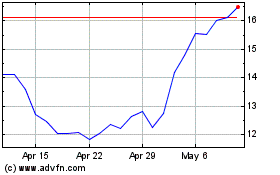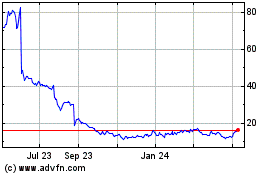Novocure (NASDAQ: NVCR) today announced 20 presentations on
Tumor Treating Fields (TTFields) therapy will be delivered at the
American Association for Cancer Research (AACR) Annual Meeting
2024, to be held April 5 to 10 in San Diego.
The presentations, describing preclinical investigations,
include new insights on how TTFields therapy can potentially
enhance the immune system’s ability to combat cancer cells and on
TTFields therapy’s effects and mechanisms in pancreatic cancer.
“The research we and our collaborators are presenting at the
AACR Annual Meeting underscores the potential of Tumor Treating
Fields therapy in treating various solid tumor types,” said Moshe
Giladi, Ph.D., Novocure’s Chief Science Officer. “We continually
explore the science of TTFields therapy to improve our product and
make a difference in the lives of patients with cancer, and we are
eager to discuss some of our latest insights with leading cancer
investigators.”
Highlights include:
- A preclinical study in a murine model of pancreatic cancer
showing that TTFields applied concurrently with standard
chemotherapy led to significantly enhanced therapeutic effects.
When used alongside gemcitabine and nab-paclitaxel (Gem/NabP),
TTFields significantly reduced tumor growth compared to the control
group, and a complete regression of tumors was observed in a number
of animals. This is a treatment regimen similar to the PANOVA-3
clinical trial examining the efficacy of TTFields in patients with
locally advanced pancreatic cancer.
- A preclinical study demonstrating a novel immunomodulatory
role for TTFields by promoting in vitro pro-inflammatory
polarization of macrophages. Macrophages exposed to TTFields
showed an increase in markers and chemicals that indicate a shift
towards a pro-inflammatory, tumor-fighting mode. The study suggests
TTFields can potentially modulate macrophages to better attack
cancer cells by pushing them toward a state more hostile to
tumors.
- An in vitro study suggesting concomitant application of
TTFields and PARP inhibitors in BRCA wild type pancreatic cancer
cells leads to improvement over monotherapy. Applied
individually, both PARP inhibitors and TTFields killed cancer
cells, stopped them from multiplying, and triggered apoptosis.
These effects were amplified when TTFields and PARP inhibitors were
applied together. These findings contribute to existing data
suggesting that TTFields induce a state of BRCAness in cancer
cells.
Presentations from Novocure-sponsored and partner programs
include:
Tumor Treating Fields (TTFields) targeted self assembling
nanoparticles for pancreatic cancer treatment: In vitro and in vivo
assessment. Presenter: P.P. Desai. 1:30 p.m. PDT on Sunday,
April 7.
Tumor Treating Fields induce the integrated stress response,
alter the transcriptional signatures of cellular metabolism, and
modulate immune-related cytokines dependent and independent of
p53. Presenter: P.R. Srinivasan. 1:30 p.m. PDT on Sunday, April
7.
Tumor Treating Fields (TTFields) disrupt cancer cell invasion
by impacting cell-ECM traction forces. Presenter: S.M. Short. 9
a.m. PDT on Monday, April 8.
N-cadherin-mediated activation of PI3K/Akt pathway following
application of Tumor Treating Fields (TTFields). Presenter: T.
Voloshin. 9 a.m. PDT on Monday, April 8.
Genomic and proteomic analysis of glioblastoma recurrences
during TTFields exposure. Presenter: M. Mazzanti. 9 a.m. PDT on
Monday, April 8.
Co-treatment with KRAS G12D inhibitor MRTX1133 plus TTFields
against human pancreatic and Colorectal cancer cell lines results
in synergistic up-regulation of cleaved PARP in KRAS G12D &
unexpectedly in KRAS G12V as well. Presenter: V. Tajiknia. 9
a.m. PDT on Monday, April 8.
Tumor Treating Fields (TTFields) for spinal metastasis:
Clinical trial concept for use of conductive implants as waveguides
to enhance TTFields strength. Presenter: C.E. Tatsui. 9 a.m.
PDT on Monday, April 8.
Tumor Treating Fields (TTFields) increase cancer cell
membrane permeability and improve sensitivity to doxorubicin in
vitro and in vivo. Presenter: T. Voloshin. 9 a.m. PDT on
Tuesday, April 9.
Development of paclitaxel-loaded nanoparticles with high
charge density. Presenter: K.Y. Bang. 1:30 p.m. PDT on Tuesday,
April 9.
Tumor Treating Fields alter PDGFR-β localization in
immortalized human pericytes in an in vitro model of the
blood-brain barrier. Presenter: C. Hagemann. 1:30 p.m. PDT on
Tuesday, April 9.
Designing arrays for delivering Tumor Treating Fields
(TTFields) to the mouse head. Presenter: I Tzchori. 1:30 p.m.
PDT on Tuesday, April 9.
Tumor Treating Fields (TTFields) induce an anti-tumor immune
response in a pancreatic cancer mouse model. Presenter: T.
Voloshin. 9 a.m. PDT on Wednesday, April 10.
Macrophage pro-inflammatory phenotype skewing by the
application of Tumor Treating Fields (TTFields). Presenter: T.
Voloshin. 9 a.m. PDT on Wednesday, April 10.
Quantitative proteomics reveal the mechanism of TTFields
therapy for glioblastoma. Presenter: Q. Mei. 9 a.m. PDT on
Wednesday, April 10.
Treatment of pancreatic cancer cells with Tumor Treating
Fields (TTFields) and PARP inhibitors. Presenter: E. Dor-On. 9
a.m. PDT on Wednesday, April 10.
Preclinical effects of Tumor Treating Fields (TTFields) with
PARP inhibitors in ovarian cancer. Presenter: E. Dor-On. 9 a.m.
PDT on Wednesday, April 10.
Preclinical investigations of concomitant Tumor Treating
Fields (TTFields) with cisplatin for treatment of cervical
cancer. Presenter: I. Tzschori. 9 a.m. PDT on Wednesday, April
10.
Tumor Treating Fields (TTFields) can induce immunogenic cell
death in GBM resulting in enhanced immune modulation.
Presenter: R.T. Nitta. 9 a.m. PDT on Wednesday, April 10.
Tumor Treating Fields (TTFields) show efficacy in
Triple-Negative breast cancer (TNBC) cells alone and in combination
with PARP inhibitor Talazoparib. Presenter: M. Ghandali. 9 a.m.
PDT on Wednesday, April 10.
TTFields and imipridone ONC206 co-treatment inhibits p-AKT
and spheroid growth and upregulates caspase-10 in human GBM cell
lines. Presenter: V. Tajiknia. 9 a.m. PDT on Wednesday, April
10.
ABOUT TUMOR TREATING FIELDS THERAPY
Tumor Treating Fields (TTFields) are electric fields that exert
physical forces to kill cancer cells via a variety of mechanisms.
TTFields do not significantly affect healthy cells because they
have different properties (including division rate, morphology, and
electrical properties) than cancer cells. The multiple, distinct
mechanisms of TTFields therapy work together to selectively target
and kill cancer cells. Due to its multimechanistic actions,
TTFields therapy can be added to cancer treatment modalities in
approved indications and demonstrates enhanced effects across solid
tumor types when used with chemotherapy, radiotherapy, immune
checkpoint inhibition, or PARP inhibition in preclinical models.
TTFields therapy provides clinical versatility that has the
potential to help address treatment challenges across a range of
solid tumors. To learn more about Tumor Treating Fields therapy and
its multifaceted effect on cancer cells, visit
tumortreatingfields.com.
ABOUT NOVOCURE
Novocure is a global oncology company working to extend survival
in some of the most aggressive forms of cancer through the
development and commercialization of its innovative therapy, Tumor
Treating Fields. Novocure’s commercialized products are approved in
certain countries for the treatment of adult patients with
glioblastoma, malignant pleural mesothelioma and pleural
mesothelioma. Novocure has ongoing or completed clinical studies
investigating Tumor Treating Fields in brain metastases, gastric
cancer, glioblastoma, liver cancer, non-small cell lung cancer,
pancreatic cancer and ovarian cancer.
Headquartered in Root, Switzerland and with a growing global
footprint, Novocure has regional operating centers in Portsmouth,
New Hampshire and Tokyo, as well as a research center in Haifa,
Israel. For additional information about the company, please visit
Novocure.com and follow @Novocure on LinkedIn and Twitter.
FORWARD-LOOKING STATEMENTS
In addition to historical facts or statements of current
condition, this press release may contain forward-looking
statements. Forward-looking statements provide Novocure’s current
expectations or forecasts of future events. These may include
statements regarding anticipated scientific progress on its
research programs, clinical study progress, development of
potential products, interpretation of clinical results, prospects
for regulatory approval, manufacturing development and
capabilities, market prospects for its products, coverage,
collections from third-party payers and other statements regarding
matters that are not historical facts. You may identify some of
these forward-looking statements by the use of words in the
statements such as “could” “anticipate,” “estimate,” “expect,”
“project,” “intend,” “plan,” “believe” or other words and terms of
similar meaning. Novocure’s performance and financial results could
differ materially from those reflected in these forward-looking
statements due to general financial, economic, environmental,
regulatory and political conditions and other more specific risks
and uncertainties facing Novocure such as those set forth in its
Annual Report on Form 10-K filed on February 22, 2024, and
subsequent filings with the U.S. Securities and Exchange
Commission. Given these risks and uncertainties, any or all of
these forward-looking statements may prove to be incorrect.
Therefore, you should not rely on any such factors or
forward-looking statements. Furthermore, Novocure does not intend
to update publicly any forward-looking statement, except as
required by law. Any forward-looking statements herein speak only
as of the date hereof. The Private Securities Litigation Reform Act
of 1995 permits this discussion.

View source
version on businesswire.com: https://www.businesswire.com/news/home/20240405540057/en/
INVESTORS & MEDIA:
Ingrid Goldberg
investorinfo@novocure.com
media@novocure.com
610-723-7427
NovoCure (NASDAQ:NVCR)
Historical Stock Chart
From Mar 2024 to Apr 2024

NovoCure (NASDAQ:NVCR)
Historical Stock Chart
From Apr 2023 to Apr 2024
